Photographs: Reuters. Sandeep Pandey
The mass violence at Maruti Suzuki's Manesar plant in Haryana July 18, 2012 was shocking. What started as a petty tiff over tea time between a supervisor and a worker Jiya Lal, during which supervisor also allegedly used caste based slur, snowballed into one of the goriest incidents of recent times.
When Jiya Lal was suspended and the management refused to revoke his suspension the same day the workers staged a sit-in after the shift was over.
During the sit-in, iron rods which actually fit into the car door, were distributed to workers secretly.
When there was a signal from the leadership which was engaged in failed negotiations with the management, the workers outpoured their wrath over 90 members of the executive including a couple of women and three Japanese nationals.
The managers were severely beaten and one of them Ashwin Kumar Dev, plant's human-resources manager, was burnt to death. Around 65 of them had to be admitted to the hospital including 3 in the Intensive Care Unit (ICU).
...
Why workers at Maruti's Manesar plant are disgruntled
Image: Officials stand in front of a damaged doorway inside the premises of Maruti Suzuki's plant in Manesar.Photographs: Ahmad Masood/Reuters.
Nobody can support this kind of mindless violence. But arresting and punishing the workers is not enough. The question needs to be asked why were the workers driven to such extremes that they took the risk of losing their jobs, their prime reason for being here, and indulged in mayhem?
In the last one year this was the fourth time the operations of the plant were halted. There are 2000-3000 employees in this plant and about a thousand contract employees. The company has announced a policy of not regularising the contract employees which it used to do earlier.
While a regular worker is likely to get Rs 17,000, a contract worker gets only Rs 7,000 per month. The employees of the Manesar plant were not even being allowed to form an independent union. The Gurgaon plant has a union, Maruti Udyog Kamgar Union, but it is widely believed to be a company run union.
...
Why workers at Maruti's Manesar plant are disgruntled
Image: A man rides his bicycle past private security guards standing outside the main entrance to the Maruti Suzuki India.Photographs: Adnan Abidi/Reuters.
Even this union is not allowed to associate with any of the national level recognised unions. The workers could see that the increase in profits because of their hard labour was going only to increase the salaries and perks of executive level employees.
This is a common trend all over the country – in both the government and private sector – as a result of the economic policies of liberalisation, privatisation and globalisation implemented about two decades ago.
The salaries for the top management, which was already better off, have gone up many times whereas wages at the bottom have marginally increased thereby widening the gap between the rich and the poor.
The salaries in government sector have gone up by more than fifteen times at the higher levels compared to about three times increase in minimum wages of daily wage workers. The nature of job is also changing.
...
Why workers at Maruti's Manesar plant are disgruntled
Image: Police and firefighters are seen at the Maruti Suzuki's plant after a clash in Manesar.Photographs: Reuters.
From hiring regular employees, now contract employees are preferred at the lower end. In Uttar Pradesh, the new CM has offered Rs 1,000 per month as unemployment allowance but almost allowed MLAs to buy a car worth Rs 20 lakh for themselves from the Local Area Development Fund (LAD) funds.
It is somehow believed that the poor can make do with much less than what is required for dignified living.
Another example is the BPL criteria of Rs 28 and Rs 32, in rural and urban areas, respectively, justified by Montek Singh Ahluwalia.
PM Manmohan Singh had once said in a CII meeting that if the gap between the rich and poor would widen then it will increase social discontent.
He had said this in the context of problem of naxalism. But it applies in general, although, there are efforts to see naxal hand behind Manesar violence too. Just as treating naxalism as a law and order problem will not solve it, treating the Manesar incident merely as a criminal act will not solve the deeper problem.
...
Why workers at Maruti's Manesar plant are disgruntled
Image: Workers assemble a car at a Maruti Suzuki plant in Manesar.Photographs: Reuters.
The questions that need to be asked in Manesar are why were the workers repeatedly resorting to movements, why was the company not listening to their valid demands, why did the management not deal with the problem in a more unbiased way (for example, the supervisor too should have been punished for using caste-based slur) and finally how did they fail to gauge the discontent among workers?
There are two ways forward. The Maruti management and other managements around the country can increase the security of their executives and make life hell for workers.
The workers everywhere will now be seen as threat to management. The other way is to build a relationship of trust with workers and allow them more participation in the running of companies.
...
Why workers at Maruti's Manesar plant are disgruntled
Image: Private security guards stand behind a damaged reception block of Maruti Suzuki's plant in Manesar, located in Haryana.Photographs: Reuters.
They could own shares and there could be equitable sharing of profits above the salaries fixed for different levels. It will be good to follow the socialist leader late Dr. Ram Manohar Lohia's criteria that the difference between the lowest and highest incomes should not be more than ten times.
The worker-management conflict arises because the private companies are run in highly undemocratic manner in a democratic society.
The problem will be fully resolved only when we move from private operations to public sector or cooperative kind of arrangements.
Just because these models may have failed in some places doesn't mean that the idea itself is flawed. Actually, most of our better managed systems, like the Indian Railways are still the in public sector.
...
Why workers at Maruti's Manesar plant are disgruntled
Image: A policeman walks inside the premises of Maruti's plant in Manesar.Photographs: Reuters.
The government should not abandon its social responsibility. It should not allow attempts to privatise services within its fold or allow private sector to take over certain sectors of economy.
It should improve upon its performance. Only then people's interest will be served best. Profit motive alone cannot be allowed to rule our lives.
Social welfare should be the objective of any government. Let us remember that our commitment to socialism is inscribed in our Constitution.

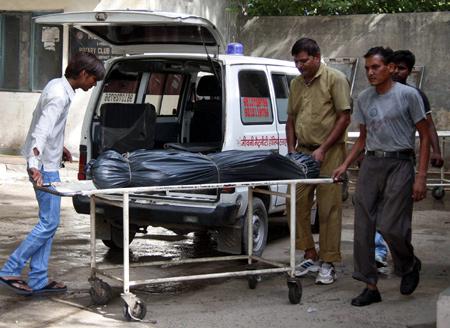
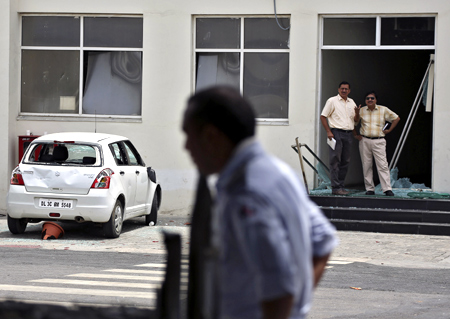
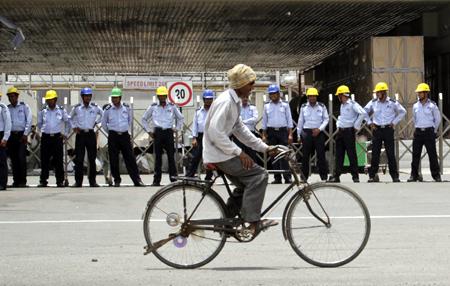
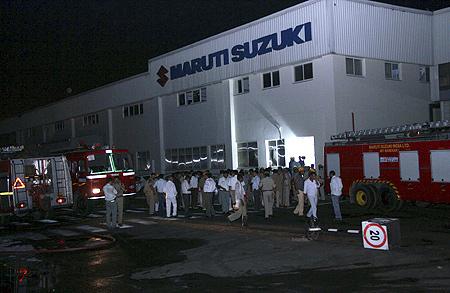
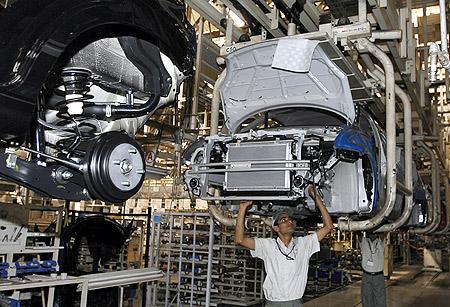
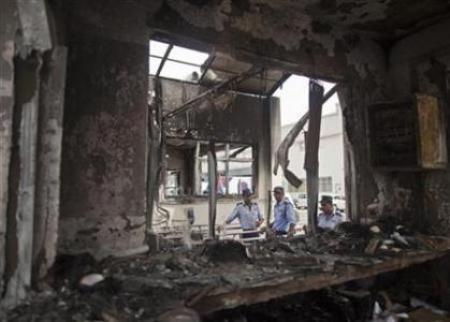
article